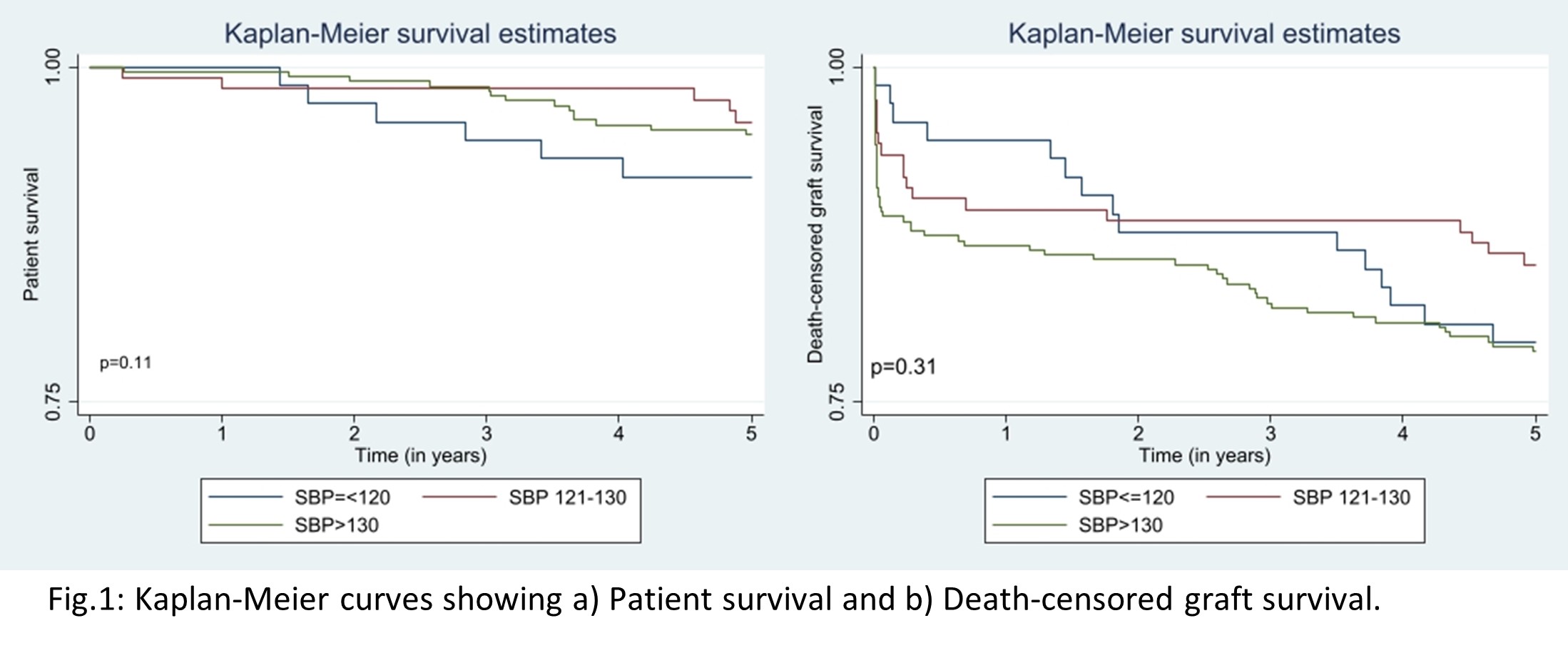Intensive Blood Pressure Control Preserves Kidney Allograft Function
K. A. Agarwal1, U. K. Agarwal2, G. S. Silva3, K. J. Pollick3, M. Pavlakis1
1Transplant Institute, Beth Israel Deaconess Medical Center, Boston, MA, 2Biostatistics consultant, Boston, MA, 3Beth Israel Deaconess Medical Center, Boston, MA
Meeting: 2021 American Transplant Congress
Abstract number: 71
Keywords: Hypertension, Kidney transplantation, Outcome, Proteinuria
Topic: Clinical Science » Kidney » Kidney: Cardiovascular and Metabolic Complications
Session Information
Session Name: Kidney: Cardiovascular and Metabolic Complications
Session Type: Rapid Fire Oral Abstract
Date: Saturday, June 5, 2021
Session Time: 6:00pm-7:00pm
 Presentation Time: 6:20pm-6:25pm
Presentation Time: 6:20pm-6:25pm
Location: Virtual
*Purpose: Kidney transplant recipients (KTRs) are at higher risk of major adverse cardiovascular events compared to the general population, with HTN being a crucial risk factor. BP targets for KTRs remain elusive. The 2009 KDIGO target of SBP<130 was based on studies in CKD population. The SPRINT trial, adopted by AHA, showed lower mortality with an intensive SBP goal (<130). We studied the effect of intensive BP control in KTRs.
*Methods: This retrospective cohort analysis included adult KTRs performed between 1/1/2002-12/31/2015 at a single academic center. BP, serum creatinine and urine protein-creatinine ratio (UPCR) were followed at 3-month intervals for 5 years after kidney transplant. Patients were divided into 3 groups based on their mean SBP (mmHg): <=120, 121-130 and >130. eGFR was calculated at 12 and 60 months using the MDRD equation. Primary outcomes were patient survival, graft survival and an eGFR decline of 25% or greater in the 5 years of follow up. Graft failure was defined as new diagnosis of ESRD post-transplant. Comparison of categorical variables was done using Pearson Chi2 test and continuous variables using Kruskal Wallis H test. Patient and graft survival were studied using Kaplan Meier survival analysis.
*Results: Table 1 & 2. Patients with mean SBP 121-130 had better patient and graft survival (Fig 1). Higher proportion of patients with SBP>130 suffered a decline of 25% or greater in their GFR and had a UPCR>1g/g during the 5-year follow-up as compared to those with SBP<=130 (Table 2).
*Conclusions: In this cohort, most patients had average SBP>130. We show that a SBP of 121-130 mmHg is associated with improved patient and graft survival compared both to higher (>130) or lower (<=120) mean values as well as slower decline of renal allograft function.
| Total (n=473) | SBP<=120 (n=73) | SBP 121-130 (n=122) | SBP>130 (n=278) | p-value | |
| Males | 295 (62.4%) | 33 (45.2%) | 75 (61.5%) | 187 (67.3%) | 0.002 |
| Age in years (mean, min-max) | 52.9 (23-82) | 47.7 (29-69) | 51.8 (23-82) | 54.9 (25-78) | 0.0001 |
| Mean SBP (mmHg) | 134 +/- 13.9 | 113.7 +/- 5.7 | 125.7 +/- 2.7 | 142.9 +/- 9.9 | 0.0001 |
| Mean DBP (mmHg) | 76.6 +/- 9.7 | 72.3 +/- 5.9 | 74.9 +/- 8.0 | 78.5 +/- 10.6 | 0.0001 |
| Mean eGFR at 12mo (mL/min) | 51.5 +/- 18.4 | 55.3 +/- 20.3 | 53.9 +/- 18.6 | 49.5 +/- 17.5 | 0.0065 |
| Mean eGFR at 60mo (mL/min) | 51.8 +/- 21.5 | 55.5 +/- 20.8 | 54.8 +/- 20.9 | 49.4 +/- 21.7 | 0.014 |
| Total (n=473) | SBP<=120 (n=73) | SBP 121-130 (n=122) | SBP>130 (n=278) | p-value | |
| Patients with eGFR decline >=25% | 15.9% | 11.9% | 12.2% | 18.8% | 0.22 |
| Spot UPCR<0.5g/g | 74.3% | 81.5% | 82% | 69.4% | 0.025 |
| Spot UPCR 0.5-0.9g/g | 9.5% | 3% | 9% | 11.2% | 0.025 |
| Spot UPCR >=1g/g | 16.2% | 15.4% | 9% | 19.4% | 0.025 |
To cite this abstract in AMA style:
Agarwal KA, Agarwal UK, Silva GS, Pollick KJ, Pavlakis M. Intensive Blood Pressure Control Preserves Kidney Allograft Function [abstract]. Am J Transplant. 2021; 21 (suppl 3). https://atcmeetingabstracts.com/abstract/intensive-blood-pressure-control-preserves-kidney-allograft-function/. Accessed July 9, 2025.« Back to 2021 American Transplant Congress

